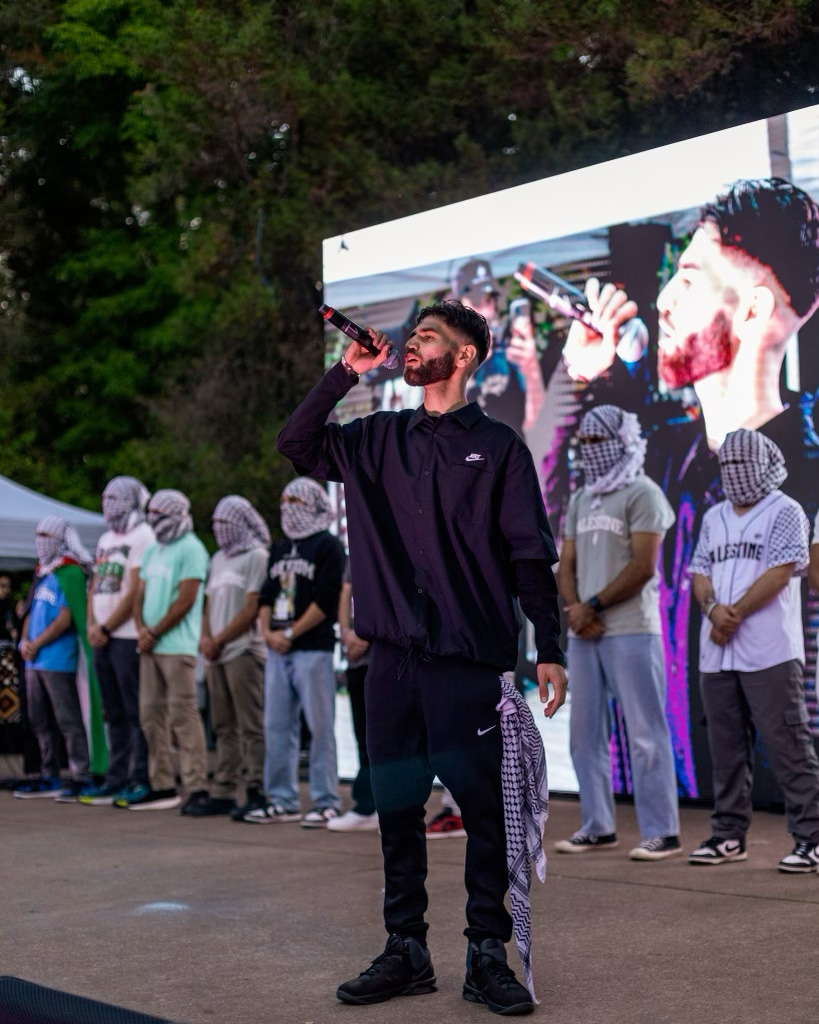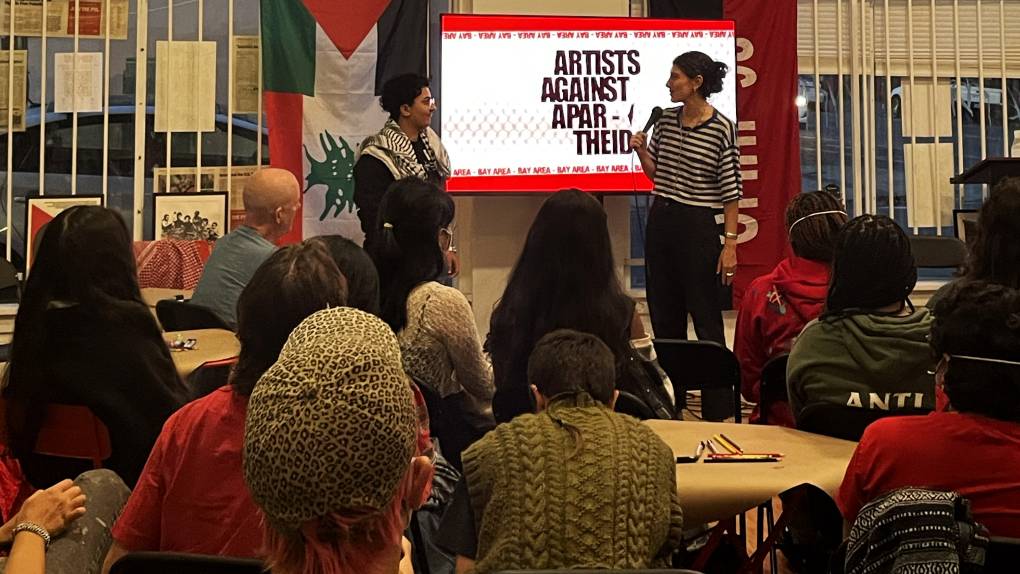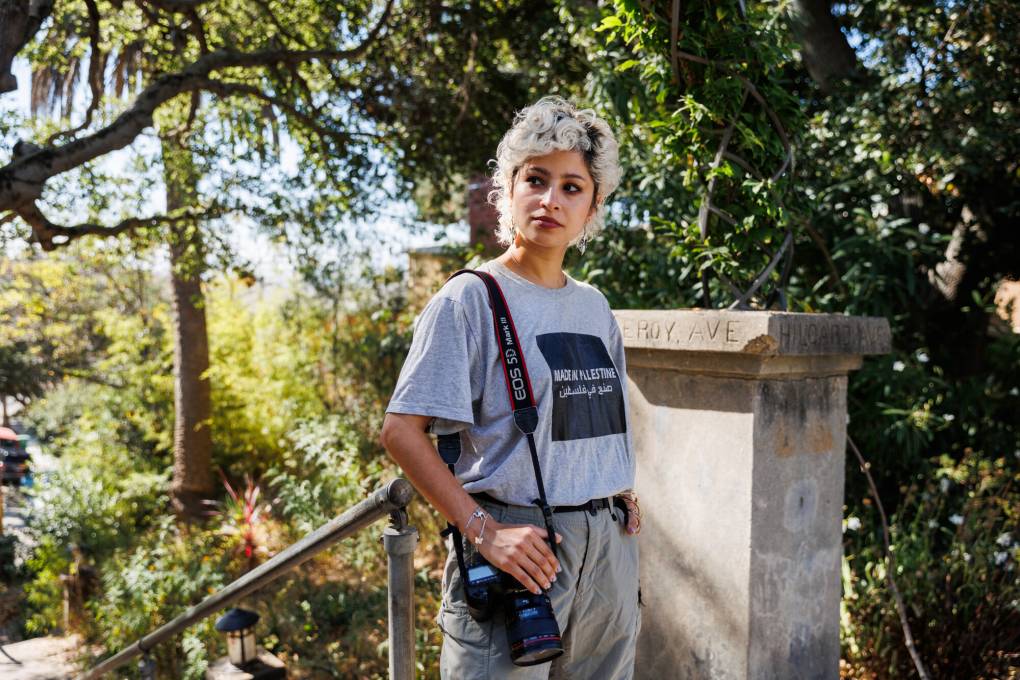Shiblaq channeled his anguish into the first single off the album, “Peace Without Freedom.” The somber yet determined track takes inspiration from a Malcolm X quote from 1965: “You can’t separate peace from freedom because no one can be at peace unless he has his freedom.” On the first verse, Shiblaq raps about the horrors of daily life in Gaza over hi-hats and a guitar sample that put his strong voice into focus. On verse two, he takes us to the West Bank, where Israeli extremists have set up illegal settlements and harass, kill and further displace Palestinians, violating international law.
“This concept that’s portrayed in the media is that the Palestinians don’t want peace,” he says of his thought process behind the track. “‘The Palestinians need to just accept getting beat up and having their land stolen. They need to just give up and let Israel win.’ And it’s a stupid concept. You’re asking people to just keep getting beat and just take it. Not tell the world. Not try to make a movement.”
Though he didn’t set out to make protest music, “Peace Without Freedom” has become a rallying cry at anti-imperialist marches, and other tracks off The Project of Liberation have gotten millions of views on TikTok. One of those is “Gaza Strip 2 Detroit,” an adrenaline-raising drill-rap anthem where Shiblaq indignantly raps: “They gon’ tryna take us off the map, but we’re still holdin’ on / Ask what I condemn, genocide — is that what y’all condone?”
Earlier this month, when Shiblaq headlined a fundraiser for Middle East Children’s Alliance at San Francisco’s African American Art & Culture Complex, teenagers in keffiyehs moshed and screamed along to the lyrics in a moment of joy and catharsis. Shiblaq exuded stoic confidence as he worked the crowd, then ended the set in a heartfelt moment by asking everyone to join him in a selfie video dedicating the show to his cousins in Gaza. (The event, put on by Arab Resource and Organizing Center, ended up raising $50,000 for relief efforts, according to the organizers.)
Shiblaq says that in addition to educating and grieving, he wants The Project of Liberation to instill a sense of pride. “I think we need to shed light on the victim, but we need to understand our goal isn’t just to dehumanize our people,” he says. “If we completely make this movement just about victimhood, then they will win. There needs to be a sense of victory and liberation.”
What does that look like? “Liberation means justice, happiness,” he says. “I think just for Palestinian people specifically, liberation means no more occupation, no more apartheid and just life.”
On a particularly poignant moment of the track “Liberation,” the beat stops and his voice rises as he puts it this way: “They put this knife in your back / They don’t pull it out / But they tell you to heal from that / Let’s just be real with that / If they took the land, the kids, the home that you lived in / You wouldn’t deal with that.”
Up next, Shiblaq is performing at Palestine Cultural Day, an Oct. 19 celebration in Redwood City, followed by shows in Chicago and Los Angeles. Growing up, he felt alone every time he tried to talk about the Palestinian struggle. But now he sees people of all backgrounds — Jewish, Black, Samoan, Mexican, Native American — out in droves at marches for Palestinian liberation. That solidarity, and his faith, help him keep going.
“I’ve lost my hope in governments. … But I do see hope in community — the communities that you build amongst your family, the friends around you,” he says. “Creating good in your world will create more good in the rest of the world. And I think that’s the best thing we can do. I can’t tell you when this is going to end. But I can tell you, the Palestinian people, they will never die. They will never leave their land.”




